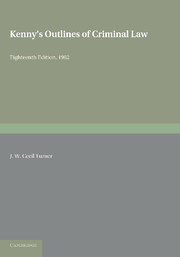Book contents
- Frontmatter
- Preface to the Sixteenth Edition
- Preface to The Seventeenth Edition
- Preface to the Eighteenth Edition
- Contents
- Index of cases
- Index to the principal statutes
- List of principal books cited
- BOOK I GENERAL CONSIDERATIONS
- BOOK II DEFINITIONS OF PARTICULAR CRIMES
- BOOK III MODES OF JUDICIAL PROOF
- CHAPTER XXVI THE NATURE OF PRESUMPTIONS AND OF EVIDENCE
- CHAPTER XXVII THE GENERAL RULES OF EVIDENCE
- CHAPTER XXVIII RULES OF EVIDENCE PECULIAR TO CRIMINAL LAW
- BOOK IV CRIMINAL PROCEDURE
- Appendix I The meaning of ‘credit’
- Appendix II II Rules as to admission of evidence which reveals to the jury facts discreditable to the person accused
- Appendix III III Forms of indictment
- Index
CHAPTER XXVIII - RULES OF EVIDENCE PECULIAR TO CRIMINAL LAW
from BOOK III - MODES OF JUDICIAL PROOF
Published online by Cambridge University Press: 05 June 2016
- Frontmatter
- Preface to the Sixteenth Edition
- Preface to The Seventeenth Edition
- Preface to the Eighteenth Edition
- Contents
- Index of cases
- Index to the principal statutes
- List of principal books cited
- BOOK I GENERAL CONSIDERATIONS
- BOOK II DEFINITIONS OF PARTICULAR CRIMES
- BOOK III MODES OF JUDICIAL PROOF
- CHAPTER XXVI THE NATURE OF PRESUMPTIONS AND OF EVIDENCE
- CHAPTER XXVII THE GENERAL RULES OF EVIDENCE
- CHAPTER XXVIII RULES OF EVIDENCE PECULIAR TO CRIMINAL LAW
- BOOK IV CRIMINAL PROCEDURE
- Appendix I The meaning of ‘credit’
- Appendix II II Rules as to admission of evidence which reveals to the jury facts discreditable to the person accused
- Appendix III III Forms of indictment
- Index
Summary
Section I. A Higher Minimum of Proof Required
In criminal cases the general principles of evidence are supplemented by some rules, and modified by others, which do not hold good in civil litigation. Of these the following deserve explanation here.
A higher minimum of proof is necessary to support an accusation of crime than will suffice when the charge is only of a civil nature. For in the latter it is sufficient that there be a preponderance of evidence in favour of the successful party, whereas in criminal cases the burden rests upon the prosecution to prove that the accused is guilty ‘beyond reasonable doubt’ (infra, 596). When therefore the case for the prosecution is closed after sufficient evidence has been adduced to necessitate an answer from the defence, the defence need do no more than show that there is a reasonable doubt as to the guilt of the accused.
Thus, for example, it has been stated :
If two people are jointly indicted for the commission of a crime and the evidence does not point to one rather than the other, and there is no evidence that they were acting in concert, the jury ought to return a verdict of not guilty against both because the prosecution have not proved the case. If, in these circumstances, it is left to the accused persons to get out of it if they can, that would put the onus upon them to prove themselves not guilty.
Even in civil proceedings, e.g. in actions of debt, a mere scintilla of evidence would not warrant the jury in finding a verdict for the plaintiff; for there must (as we have seen) be so much evidence that a reasonable man might accept it as establishing the issue. But in criminal cases the presumption of innocence is still stronger, and accordingly a still higher minimum of evidence is required; and the more heinous the crime the higher will be this minimum of necessary proof.
- Type
- Chapter
- Information
- Kenny's Outlines of Criminal Law , pp. 501 - 530Publisher: Cambridge University PressPrint publication year: 2013



